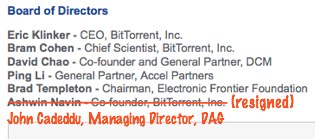 “I have never seen anything like this” said a corporate law partner at a large silicon valley law firm. He was referring to the undoing of a $17 million venture round at BitTorrent and subsequent recapitalization that we reported yesterday.
“I have never seen anything like this” said a corporate law partner at a large silicon valley law firm. He was referring to the undoing of a $17 million venture round at BitTorrent and subsequent recapitalization that we reported yesterday.
In one board action, $10 million was removed from the company’s bank account and the valuation slashed from $177 million to just $35 million.
Recapitalizations, where existing stockholders are crammed down to near zero equity in anticipation of a new round of financing at a lower valuation, are common. Particularly in down markets. Old investors are forced to put in new capital to maintain their ownership. New stock options are awarded to current employees. Anyone who’s left the company, even founders, are left with nothing. Even though they’ve often paid hard cash to exercise stock options.
Recaps are the only way to make bloated startups that have run out of cash healthy again. But they only happen when a company is desperate for cash and has no other options. The reason is clear – the board of directors has a fiduciary duty to protect stockholders. Recapitalizations are not good for existing stockholders, and can only be approved when the company has no other choice.
But what happened at BitTorrent wasn’t a standard recapitalization. Nothing about the BitTorrent reorganization was standard, in fact. The company, which laid off more than 2/3 of staff (65 to 19 employees), had over $20 million in the bank before this transaction, says a source close to the company. They weren’t generating much revenue from toolbar and device installations – just $5 million or so annually – but at least the company had plenty of runway left.
In other words, the fiduciary duty of the board of directors to the stockholders of BitTorrent was almost certainly disregarded.
The letter to stockholders said that “DAG claimed that the Series C financing should be substantially renegotiated.” But our sources say that Accel was the firm to insist on the change, forced the decision on everyone else, and let DAG take the fall. Why did DAG allow that to happen? The firm’s whole investment thesis is to follow top tier firms like Accel and Sequoia, investing in later rounds at higher valuations. They have to keep these top firms happy. As a result, they are effectively a whipping boy when someone has to be held publicly responsible for unpopular actions.
 But the real question about the recap is why the board of directors let it happen. The board has a strict fiduciary duty to protect stockholders. That didn’t happen here, since all existing stockholders were effectively wiped out by the recap.
But the real question about the recap is why the board of directors let it happen. The board has a strict fiduciary duty to protect stockholders. That didn’t happen here, since all existing stockholders were effectively wiped out by the recap.
So why did the board vote for this extraordinary transaction? Two of the board members, Ping Li (Accel) and David Chao (DCM), are investors in the company and stood to gain financially from the rescission and recap. CEO Erik Klinker is an Accel man, having previously worked at Accel-funded Internap. That leaves founder Bram Cohen, founder Ashwin Navin and outside director Brad Templeton.
Navin voted against the transaction. Templeton voted for it, but refused to comment when I asked him why he felt this was in the best interest of the company and it’s stockholders. Cohen also voted for the transaction, and as the majority holder of common stock he was a necessary vote. Without him, the transaction would not have happened.
So why did Cohen agree to vote for the transaction? Speculation abounds, but one aspect of the transaction is suspicious. The term sheet calls for $750,000 to be spent buying back shares from common stock holders. That mostly means Cohen, who is reportedly getting the lion’s share of the 30% of the company put aside for current employees. Cohen, who has recently had highly publicized financial troubles, may have simply been bought off.
There’s no other reason for the stock buyback. If the company is in a dire enough financial situation to warrant an unprecedented rescission of a $17 million financing, then money that’s left sure as hell shouldn’t be spent in payouts to founders.
BitTorrent and Accel will not respond to requests for comment. Everyone is keeping quiet. For now.